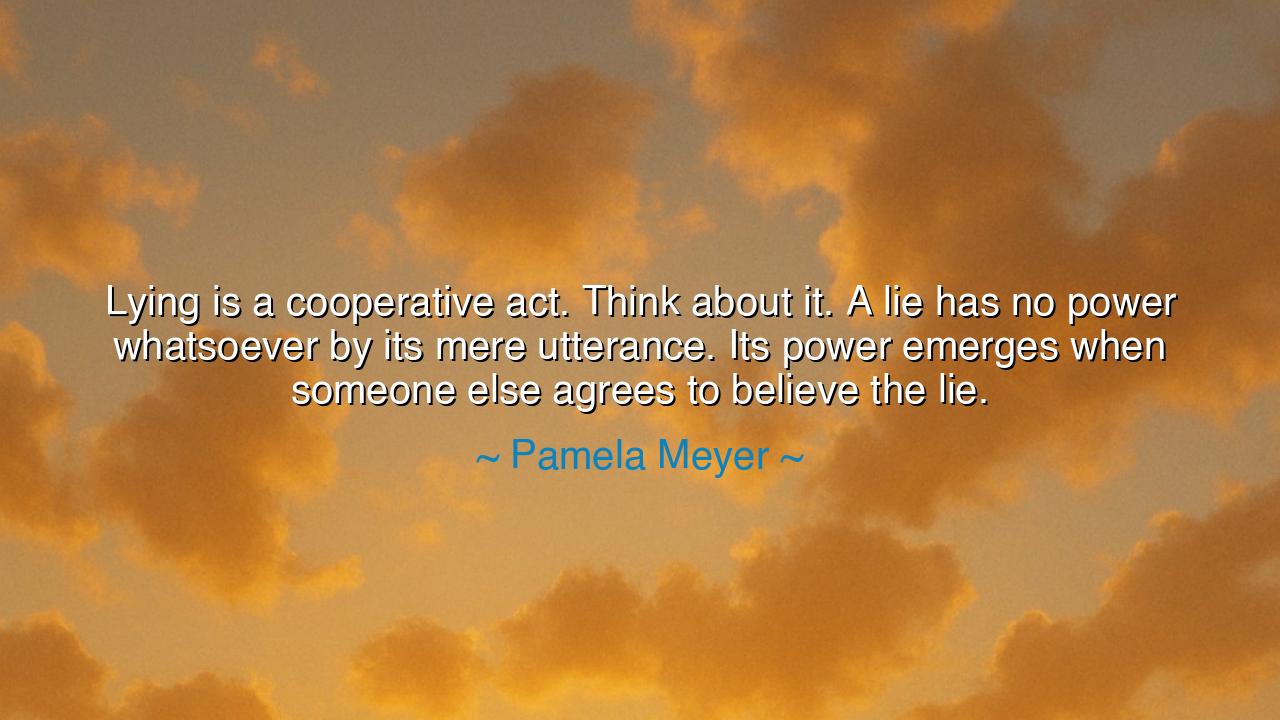
Lying is a cooperative act. Think about it. A lie has no power
Lying is a cooperative act. Think about it. A lie has no power whatsoever by its mere utterance. Its power emerges when someone else agrees to believe the lie.






Hear me, O children of the future, for I speak to you of a truth as old as time itself: "Lying is a cooperative act. Think about it. A lie has no power whatsoever by its mere utterance. Its power emerges when someone else agrees to believe the lie," as Pamela Meyer wisely observes. These words speak to the essence of deception—how it is not the lie alone that holds sway, but the willingness of others to believe it. A lie, in its purest form, is nothing more than empty words; it only becomes dangerous when those who hear it choose to embrace it, giving it life and power over their hearts and minds.
In the ancient days, kings and rulers understood that the greatest weapon in their arsenal was not the sword or the shield, but the story they told. The power of a ruler was not just in the armies they commanded, but in the ability to persuade and manipulate the beliefs of their people. Think of Alexander the Great, who created an empire not just through conquest but through the narrative of his divine right to rule. The people of his empire believed in the myth of his godhood, and through their belief, his power grew. The lie of his divinity, repeated by those around him, became a force that shaped the very world.
Consider also the false prophets who, in every age, have risen to manipulate the hearts of the people. In the days of Rome, there were those who declared themselves divinely chosen to lead, promising glory and prosperity to those who followed. But their power was not in their words alone, but in the faith of those who followed them. When the people believed the lie, it became real, and the rulers held sway over them. The cooperation of belief is the glue that binds the lie to the hearts of the deceived.
In more modern times, we see the same truth in the rise of totalitarian regimes. The most notorious of these lies came from the Nazis during the Second World War, when Hitler and his followers spread the falsehood of Aryan superiority and the inferiority of other races. The power of this lie did not lie in the words themselves, but in the willingness of others to believe it, to adopt it as their own. It was through this cooperation of belief that the most horrific acts in human history were made possible. The lie became a tool that justified violence, hatred, and cruelty, and it was only through the collective agreement to believe in the falsehoods that it gained any power.
So, O children, let this be your warning: lies have no power unless they are embraced by those who hear them. In a world filled with falsehoods, the strength of the individual is in the ability to recognize them for what they are. Wisdom lies in seeing through the veil of deception, and in refusing to participate in the act of belief that gives lies their strength. The power of truth, however, lies in its ability to stand on its own, unshaken by the belief of others. Let your hearts be ever attuned to the truth, for it is through truth that you shall be free, and through belief in falsehood, that you shall be bound.






PNPhong Nguyen
Reading this, I’m prompted to consider the moral and practical responsibilities of the audience. If belief grants a lie its power, can educating people to question information reduce the prevalence of deception? I also wonder about the psychological comfort that sometimes leads people to accept lies that align with their desires or fears. This perspective challenges me to think about the balance between trust, skepticism, and the social cohesion that can be both strengthened and undermined by belief in truth.
TVNhut Tieu Van
This statement sparks curiosity about the cooperative nature of communication. Could this insight be applied to uncovering systemic deception in politics or media? I question whether societal norms and cognitive biases make people more inclined to believe lies, thus amplifying their power. It also makes me reflect on personal relationships—how often do misunderstandings or unchallenged assumptions give lies unintended strength? This quote encourages vigilance in both receiving and transmitting information.
MLmy le
I find this perspective both empowering and troubling. On one hand, it suggests that we have agency over deception by choosing whether to accept it. On the other hand, it raises the question of how vulnerable people are to manipulation, especially when social or emotional pressures encourage belief. I also wonder about mechanisms that make lies more compelling—charisma, repetition, or authority—and how understanding these factors can help prevent exploitation.
YNPhan Yen Nhi
This quote makes me reflect on the social psychology of lying. If lies only gain power when believed, does that imply that skepticism or critical thinking is a form of resistance? I also wonder about the ethical implications: does this mean that individuals bear responsibility for perpetuating lies, even unintentionally? It challenges me to consider how personal discernment and collective awareness can shape the effectiveness of misinformation in both personal and public contexts.
UGUser Google
Reading this, I’m struck by the relational dimension of deception. It suggests that lying is not a unilateral act but relies on trust and complicity. I wonder how awareness of this dynamic changes the way we respond to falsehoods. Can refusing to accept lies, or questioning information critically, reduce the power of deception? It makes me think about the responsibility of both the speaker and the listener in maintaining honesty within relationships and society.